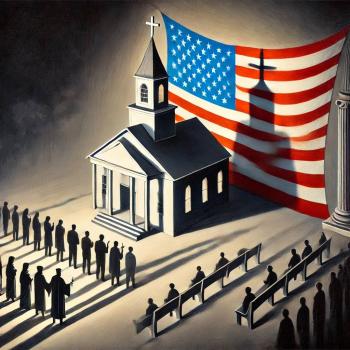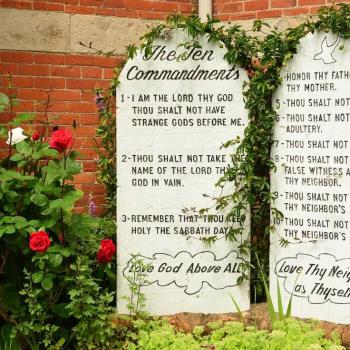
Dear God, I Hope Not
Americans will vote in off-year elections this Nov. 7. As we go to the polls, we should be thinking about the nation’s ongoing argument over separation of church and state. It’s an important issue.
The debate moved back to the forefront recently because of statements made by the new Speaker of the House, Mike Johnson.
So, let’s see what Johnson said, look at what the constitution says about separation of church and state, consider statements by several founding fathers, and determine whether Johnson and other Republican politicians are crossing the line when it comes to faith and government.
But first, let me explain myself. I’m a devout Christian who believes in separation of church and state. When I left home to attend college, I left conservative Christianity behind. I didn’t walk away from it. I ran as hard and fast as I could go, although I didn’t leave Christianity.
I love the Christian faith, but I struggle to love fellow Christians who twist the Bible, as well as the constitution. This post isn’t intended to attack the whole of Christianity. It is intended to point out what a minority of Christians are doing to the faith and to the nation.
So here goes….
Taking Control
I’m angry at radical conservatives who feel they have an exclusive claim to God and country. They don’t of course, but many of them believe their opinions are the only ones that matter.
They want to force those opinions on the rest of the country, and their attitude is totally unacceptable given the fact that the U.S. is supposed to be a republic.
New Speaker Speaks
The latest controversy over separation of church and state erupted when Speaker Mike Johnson spoke on the House floor shortly after assuming his new role.
“I believe that Scripture and the Bible is (sic) very clear that God is the one that raises up those in authority,” Johnson said. “He raised up each of you, all of us. And I believe God has ordained and allowed each one of us to be brought here for this specific moment and this time.”
Would Johnson have made this statement if liberals were the dominant force in Congress? I don’t think so.
Separation of Church and State
The phrase “separation of church and state” does not appear in the U.S. Constitution. However, the First Amendment contains two clauses that clearly separate church and state. They are the Establishment Clause and the Free Exercise Clause.
1 — The Establishment Clause says, “Congress shall make no law respecting an establishment of religion or prohibiting the free exercise thereof.”
Thus, it forbids the government from establishing a state church in the U.S., taking sides when religions are in conflict, and favoring the religious over the nonreligious.
“This did not mean that the framers (of the constitution) believed that the American people should be any less religious than they choose to be,” nor did it mean that there was something wrong with having “religious elements in the culture,” explained Michael W. McConnell, a constitutional expert with the Stanford Constitutional Law Center.
“What it meant is that we would not have a system in which the government was able to tell us what to believe, was able to control churches, decide… their doctrines, decide who their personnel would be, and so forth,” McConnell explained. Read more here.
Yet, the U.S. Supreme Court has been “chipping away the ‘wall of separation’ envisioned by Thomas Jefferson” since John Roberts was confirmed as chief justice in 2005,” according to “Governing,” an online news magazine. “The court has ruled in favor of religious organizations 83 percent of the time….”
2 — The other clause — the Free Exercise Clause — gives Americans the right to worship as they please as long as their religious practices don’t conflict with public morals. The government may intervene only when there is a “compelling” reason to do so because of the common good.
An example of “common good” is found in a 1944 Supreme Court decision that gives states the right to require immunizations of children even when the children’s parents object. The court ruled that the “common good” outweighs parents’ rights regarding vaccinations.
What the Founding Fathers Said
America’s founding fathers gave the church-state issue a great deal of thought and took great care in writing religious freedom into the constitution. Many of their ancestors had fled Europe’s state religions in search of religious freedom, and these men did not want their new country to repeat past mistakes.
Consequently, the framers of the constitution included language that prohibits the government from creating a state religion or forcing anyone to follow a religion against their will.
Their goal was to protect all citizens from religious coercion.
Thomas Jefferson, the nation’s third president, called for a “wall of separation” between church and state. He and James Madison, our fourth president, agreed that citizens should not be forced to support a specific religion through taxation.
They believed that this form of coercion deprived people of their religious freedom. They also were concerned “that allowing religion and religious denominations to cross over the wall and introduce beliefs and practices into the governing realm would create a polarizing environment that could make policy decisions and national leadership a difficult and contentious process,” said Michael Kryzanek.
Dr. Kryzanek is an expert on U.S. foreign policy and government. He has written several books on the subject and is professor emeritus of political science at Bridgewater State University for Global Engagement in Massachusetts.
Roger Williams, an early leader in colonial America and founder of Rhode Island, believed in separation of church and state for different reasons.
“Unlike Thomas Jefferson, who would follow, Williams did not wish to separate church and state primarily to preserve the peace and purity of the state but rather to preserve the peace and integrity of the church,” according to the Free Speech Center at Middle Tennessee State University.
“He opposed linking political and economic privilege to church membership because such privileges corrupted the honesty of religious life.”
Americans Behaving Badly
Is the U.S. a “Christian nation”? Hardly. All we need to do is look at the constitution and then look at ourselves to see how unchristian we really are.
The constitution did not establish the U.S. as a “Christian nation.” It did establish religious freedom, which gives Americans the right to worship as they please or to reject religion altogether.
Modern-day politicians need to tread very carefully when they inject religion into government.
Mass Shootings
When we look at ourselves as a country, we need to consider an alarming fact. This year, the U.S. has seen at least 565 mass shootings as of Oct. 26, according to ABC News. Keep in mind that these are shootings rather than deaths, meaning that the number of deaths is higher than 565.
Then, think about this. There were 11 shootings in which at least 12 people died between 1949 and 2011, according to Axios, an American-based news website.
Those statistics should stop us in our collective tracks. The U.S. had fewer than 12 mass shootings in a 62-year period, and nearly 600 deaths in the first 10 months of 2023.
How can anyone say the U.S. is Christian when we have had more mass killings than days in the year?
“More Americans died of gun-related injuries in 2021 than in any other year on record,” according to the Centers for Disease Control and Prevention (CDC).
The CDC report, which contains its latest available data, includes gun-related murders and suicides, gun-related incidents involving law enforcement, accidental deaths and unspecified gun-related situations.
The total number of gun-related deaths in 2021 was 48,830 people, including 2,571 children. Our society obviously values one person’s right to own a gun over another person’s right to live. How is that Christian?
Discrimination
And how can the U.S. claim to be a Christian nation when Christians discriminate against and mistreat Jews, Muslims, Mormons and other non-Christians because of their religious beliefs?
Then, there’s the LGBTQ+ community, which many Americans despise, and we cannot forget to mention people of color, who the white majority wants to suppress.
How can we call ourselves a “Christian nation” when we discriminate against these people who are our neighbors according to the Bible?
When we treat non-Christians with suspicion, discriminate against people who are “different,” call non-Christians offensive names or physically attack people because of their religion or lack of faith, we are driven by hatred rather than Christ’s love.
Christians should remember that Christ commanded his followers to “love thy neighbor.” When Americans rack up statistics such as the ones I mentioned, we are giving lip service to Christ’s command or ignoring it entirely.
No, Americans are not behaving the way a Christian nation should behave.
The Dangers of Christian Nationalism
With the rise of militant Christian nationalism in the U.S., conservative Christians need to be reminded that Christ was apolitical during his earthly ministry. In fact, he told his followers, “Render therefore unto Caesar the things which are Caesar’s and unto God the things that are God’s” (Matthew 22:22).
If Christ separates faith from secular politics, shouldn’t we mere mortals do the same?
We also need to realize that religious nationalism is dangerous when it seeks to replace separation of church and state with any religion. Success in that endeavor would mean tyranny.
God Isn’t a Republican
My understanding of scripture is that God gives people freewill. If we accept Christ at his word, we must accept that God is not a Republican. He does not get involved in the politics of any country including the U.S., and he does not influence elections.
But what if God had “raised up” certain people to positions of authority, as House Speaker Johnson recently claimed? If we assume that Johnson is correct, then we must ask ourselves why a loving God “raised up” people like Adolf Hitler, Joseph Stalin and Saddam Hussein.
These men were brutal dictators who terrorized innocent people, ruthlessly targeted men, women and children, and caused the deaths of millions upon millions of people. A loving and politically engaged God would not have allowed such men to gain power.
Religious Beliefs & Political Decisions
I have written a number of articles about faith and politics for Patheos, and you may read some of them here.
They include “Did Our Earliest Presidents Let Personal Religious Beliefs Influence Their Decisions?” which you may read by clicking here.
Read “Has the Christian Flag Become Too Politicized? by clicking here.
And read “Jimmy Carter: A President Whose Christian Faith Shines” here.
I’m a great admirer of Jimmy Carter because I believe that he is a man of integrity whose faith is real. That combination is hard to find these days.
There’s no doubt that Carter’s religious beliefs have influenced his thoughts and behavior throughout his life, including his time as governor of Georgia and president of the United States. He is human after all.
Yet, evangelical Americans turned their backs on him in the 1980 presidential election because he insisted on separating his personal beliefs from his constitutional duties while in office.
Rather than promote conservatives’ narrow religious agenda, Carter tried to make decisions that benefited all of the people he served. And he was voted out of office as a result.
The BIG Lie
Today’s right-wing conservatives insist that the U.S. is a Christian nation, and they sell this falsehood to people who don’t know any better. It’s called “the big lie.”
These opinion leaders either haven’t read the U.S. Constitution, or more likely, they have read it and decided to deliberately misinterpret it.
In promoting this lie, they are cynically using many voters’ sincere religious beliefs in order to win elections, gain power and fill their pockets.
They know that repetition of lies will eventually convince a large segment of the population that the U.S. Constitution says something it doesn’t say — especially when they’re saying something these voters want to hear.
It’s quite obvious to anyone who pays attention that politicians use Christianity to win votes. Some may be sincere in their religious beliefs, but many are not. They would drop their Christian mask in a heartbeat if their constituents suddenly became Muslim, Buddhist or New Age. Anything to win votes.
More Information
You may read more about these issues by checking some of my resources.
- Stanford Constitutional Law Center. “Framers Said Nothing Wrong with Religion in Culture”
- “Governing”: “The History Behind the Separation of Church and State in America”
- Free Speech Center at MTSU: “Establishment Clause (Separation of Church and State”
- Thomas Jefferson: “Jefferson and Religious Freedom”
- Religion and Government Separation: “Religion and Government Separation”
- United States Courts: “First Amendment and Religion”
- Pew Research Center: “Too Much Religious Talk by Politicians”













